28 08 2020
[August-2020]300-410 300-410 94Q 300-410 Exam Dumps Free Download in Braindump2go[Q47-Q62]
2020/August Latest Braindump2go 300-410 Exam Dumps with PDF and VCE Free Updated Today! Following are some new 300-410 Real Exam Questions!
QUESTION 47
Which protocol is used to determine the NBMA address on the other end of a tunnel when mGRE is used?
A. NHRP
B. IPsec
C. MP-BGP
D. OSPF
Answer: A
Explanation:
NHRP is used to map tunnel IP addresses to “physical” or “real” IP addresses (NBMA addresses), used by endpoint routers. It resolves private addresses (those behind mGRE and optionally IPsec) to a public address.
QUESTION 48
Which two protocols can cause TCP starvation? (Choose two)
A. TFTP
B. SNMP
C. SMTP
D. HTTPS
E. FTP
Answer: AB
QUESTION 49
Which two statements about VRF-Lite configurations are true? (Choose two.)
A. They support the exchange of MPLS labels
B. Different customers can have overlapping IP addresses on different VPNs
C. They support a maximum of 512.000 routes
D. Each customer has its own dedicated TCAM resources
E. Each customer has its own private routing table.
F. They support IS-IS
Answer: BE
QUESTION 50
A network engineer needs to verify IP SLA operations on an interface that shows on indication of excessive traffic. Which command should the engineer use to complete this action?
A. show frequency
B. show track
C. show reachability
D. show threshold
Answer: B
QUESTION 51
Refer to the exhibit. An engineer is trying to generate a summary route in OSPF for network 10.0.0.0/8, but the summary route does not show up in the routing table. Why is the summary route missing?
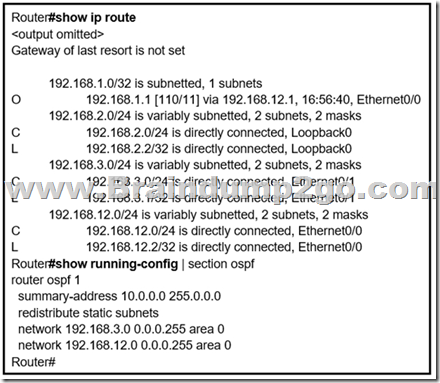
A. The summary route is not visible on this router, but it is visible on other OSPF routers in the same area.
B. The summary-address command is used only for summary prefixes between areas.
C. The summary route is visible only in the OSPF database not in the routing table.
D. There is no route for a subnet inside 10.0.0.0/8, so the summary route is not generated.
Answer: D
Explanation:
The “summary-address” is only used to create aggregate addresses for OSPF at an autonomous system boundary. It means this command should only be used on the ASBR when you are trying to summarize externally redistributed routes from another protocol domain or you have a NSSA area. But a requirement to create a summarized route is:
“The ASBR compares the summary route’s range of addresses with all routes redistributed into OSPF on that ASBR to find any subordinate subnets (subnets that sit inside the summary route range). If at least one subordinate subnet exists, the ASBR advertises the summary route.”
But in this case we found no prefix that belongs to 10.0.0.0/8. Therefore a summarized route for this subnet could not be created.
Note:
+ If a prefix of this subnet exists in the routing table then after the summarization is performed, we will see such an entry:
Router# show ip route
— output omitted —
0 10.0.0.0/8 is a summary via null0
QUESTION 52
Refer to the exhibit. Why is user authentication being rejected?

A. The TACACS+ server expects “user” but the NT client sends “domain\user”
B. The TACACS+ server refuses the user because the user is set up for CHAP
C. The TACACS+ server is down and the user is in the local database
D. The TACACS+ server is down and the user is not in the local database
Answer: D
Explanation:
In the output we noticed that the “Destination unreachable; gateway or host down” notification while trying to communicate with the TACACS+ server. This means the TACACS+ server went down. So the next authentication method is via the local database (“Method=LOCAL”). But the authentication was failed again because of bad username, bad password or both.
Reference: https://www.cisco.com/c/en/us/support/docs/security-vpn/terminal-access-controller-access-control-system-tacacs-/13864-tacacs-pppdebug.html
QUESTION 53
Which is statement about IPv6 inspection is true?
A. It learns and secures bindings for stateless autoconfiguration addresses in Layer 3 neighbor tables.
B. It learns and secures bindings for stateless autoconfiguration addresses in Layer 2 neighbor tables.
C. It learns and secures bindings for stateful autoconfiguration addresses in Layer 3 neighbor tables.
D. It learns and secures bindings for stateful autoconfiguration addresses in Layer 2 neighbor tables.
Answer: B
Explanation:
IPv6 Neighbor Discovery (ND) inspection learns and secures bindings for stateless autoconfiguration addresses in Layer 2 neighbor tables. IPv6 ND inspection analyzes ND messages in order to build a trusted binding table. IPv6 ND messages that do not have valid bindings are dropped.
Reference: https://www.cisco.com/c/en/us/td/docs/ios-xml/ios/ipv6_fhsec/configuration/15-sy/ip6-nd-inspect.html
QUESTION 54
Refer to the exhibit. After redistribution is enabled between the routing protocols; PC2, PC3, and PC4 cannot reach PC1.
Which action can the engineer take to solve the issue so that all the PCs are reachable?
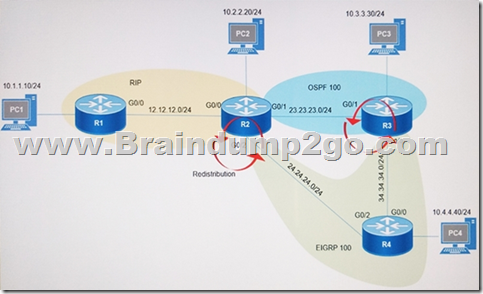
A. Filter the prefix 10.1.1.0/24 when redistributed from OSPF to EIGRP.
B. Set the administrative distance 100 under the process on R2.
C. Filter the prefix 10.1.1.0/24 when redistributed from RIP to EIGRP.
D. Redistribute the directly connected interfaces on R2.
Answer: A
Explanation:
It seems there is a loop because of mutual redistributions among RIP, OSPF and EIGRP domains. So we should filter out the prefix 10.1.1.0/24 when redistributed from OSPF to EIGRP (the second redistribution point) to prevent routing loop.
QUESTION 55
An engineer configured the wrong default gateway for the Cisco DNA center enterprise interface during the install.
Which command must the engineer run to correct the configuration?
A. Sudo update config install
B. Sudo maglev reinstall
C. Sudo maglev-config update
D. Sudo maglev install config update
Answer: C
Explanation:
Once the appliance is configured, you cannot use the Configuration Wizard to change all Cisco DNA Center appliance settings. Changes are restricted to the following settings only:
+ Host IP address of the appliance
+ DNS server IP addresses
+ Default gateway IP address
…
Procedure
Using a Secure Shell (SSH) client, log into the IP address of the Enterprise port of the Cisco DNA Center appliance that needs to be reconfigured, on port 2222. For example:
ssh maglev@Enterprise-port’s-IP-address -p 2222
Step 2
When prompted, enter the Linux Password.
Step 3
Enter the following command to access the Configuration Wizard.
$ sudo maglev-config update
If prompted for the Linux Password, enter it again.
…
For more information about this procedure, please read https://www.cisco.com/c/en/us/td/docs/cloud-systems-management/network-automation-and-management/dna-center/1-2/install/b_dnac_install_1_2/b_dnac_install_1_2_chapter_011.html
QUESTION 56
Refer to the exhibit. An engineer configures a static route on a router, but when the engineer checks the route to the destination, a different next hop is chosen. What is the reason for this?
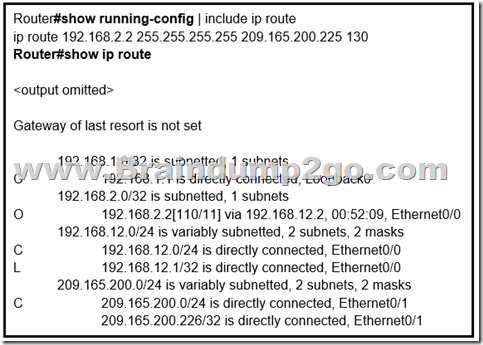
A. The configured AD for the static route is higher than the AD of OSPF.
B. The metric of the OSPF route is lower than the metric of the static route.
C. Dynamic routing protocol always have priority over static routes.
D. The syntax of the static route is not valid do the route is not considered.
Answer: A
Explanation:
The AD of static route is manually configured to 130 which is higher than the AD of OSPF router which is 110.
QUESTION 57
Refer to the exhibit. An engineer is troubleshooting BGP on a device but discovers that the clock on the device does not correspond to the time stamp of the log entries.
Which action ensures consistency between the two times?

A. Configure the logging clock synchronize command in global configuration mode
B. Configure the service timestamps log uptime command in global configuration mode
C. Configure the service timestamps log datetime localtime command in global configuration mode
D. Make sure that the clock on the device is synchronized with an NTP server
Answer: C
Explanation:
Even we had a synchronized clock but it may show different timezone so we should set the “localtime” keyword (which uses local time zone for timestamps) so that the time of logging messages is matched with our clock.
QUESTION 58
Refer to the exhibit. ISP 1 and ISP 2 directly connect to the internet.
A customer IS tracking both ISP links to achieve redundancy and cannot see the Cisco IP SLA tracking output on the router console.
Which command is missing from the IP SLA configuration?
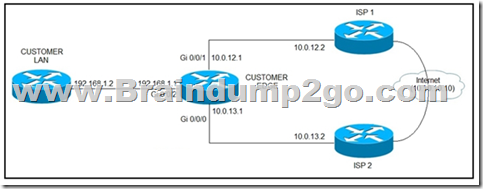
A. Start-time now
B. Start-time 00:00
C. Start-time 0
D. Start-time immediately
Answer: A
Explanation:
Although the IP SLA tracking has been configured but it needs to activate with the “start-time now” keyword. An example of configuring IP SLA for ICMP echo and start it immedicately is shown below:
ip sla 2
icmp-echo 10.10.10.10
!
ip sla schedule 2 start-time now
QUESTION 59
Refer to the exhibit. Users in the branch network of 2001:db8:0:4::/64 report that they cannot access the Internet. Which command is issued in IPv6 router EIGRP 100 configuration mode to solve this issue?
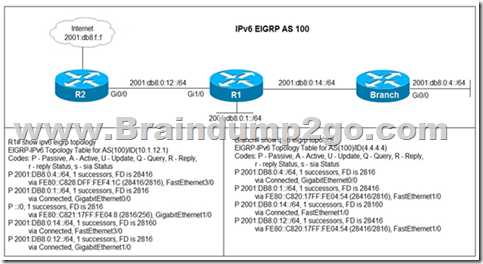
A. Issue the eigrp stub command on R1
B. Issue the no neighbor stub command on R2.
C. Issue the eighr command on R2.
D. Issue the no eighrp stub command on R2.
Answer: B
Explanation:
In the output of R1, we see R1 has a default route to the Internet via G1/0, which is correct but R2 does not have this route. One reasonable answer of this issue is R1 has been configured as a stub router so it only advertised connected and summary routes. In Branch router output, we also see routes that are directly connected to R1 only.
Note: In this topology, only Branch router should be configured as stub, not R1 router.
QUESTION 60
Which protocol does VRF-Lite support?
A. IS-IS
B. ODR
C. EIGRP
D. IGRP
Answer: C
QUESTION 61
Refer to Exhibit. Which statement about redistribution from BGP into OSPF process 10 is true?
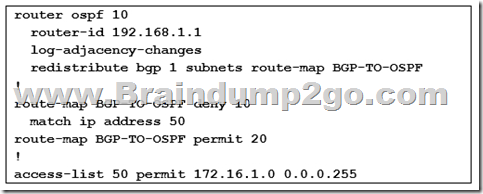
A. Network 172.16.1.0/24 is not redistributed into OSPF.
B. Network 10.10 10.0/24 is not redistributed into OSPF
C. Network 172.16.1.0/24 is redistributed with administrative distance of 1.
D. Network 10.10.10.0/24 is redistributed with administrative distance of 20.
Answer: A
Explanation:
The first statement of the above route-map (route-map BGP-TO-OSPF deny 10) will prevent network 172.16.1.0/24 from being redistributed into OSPF.
QUESTION 62
Which two statements about redistributing EIGRP into OSPF are true? (Choose two)
A. The redistributed EIGRP routes appear as type 3 LSAs in the OSPF database
B. The redistributed EIGRP routes appear as type 5 LSAs in the OSPF database
C. The administrative distance of the redistributed routes is 170
D. The redistributed EIGRP routes appear as OSPF external type 1
E. The redistributed EIGRP routes as placed into an OSPF area whose area ID matches the EIGRP autonomous system number
F. The redistributed EIGRP routes appear as OSPF external type 2 routes in the routing table
Answer: BF
Resources From:
1.2020 Latest Braindump2go 300-410 Exam Dumps (PDF & VCE) Free Share:
https://www.braindump2go.com/300-410.html
2.2020 Latest Braindump2go 300-410 PDF and 300-410 VCE Dumps Free Share:
https://drive.google.com/drive/folders/1NkZ6PH5JebhsyHrMEXD3IWxkOLRjQ-B-?usp=sharing
3.2020 Free Braindump2go 300-410 PDF Download:
https://www.braindump2go.com/free-online-pdf/300-410-Dumps(Q72-Q78).pdf
https://www.braindump2go.com/free-online-pdf/300-410-PDF(Q49-Q60).pdf
https://www.braindump2go.com/free-online-pdf/300-410-PDF-Dumps(Q27-Q37).pdf
https://www.braindump2go.com/free-online-pdf/300-410-VCE(Q38-Q48).pdf
https://www.braindump2go.com/free-online-pdf/300-410-VCE-Dumps(Q61-Q71).pdf
Free Resources from Braindump2go,We Devoted to Helping You 100% Pass All Exams!
[2020-August-New]Free Braindump2go 300-920 PDF and VCE Dumps Download[Q34-Q49] [2020-August-New]350-401 PDF Dumps Free Download in Braindump2go[Q61-Q75]
Comments are currently closed.